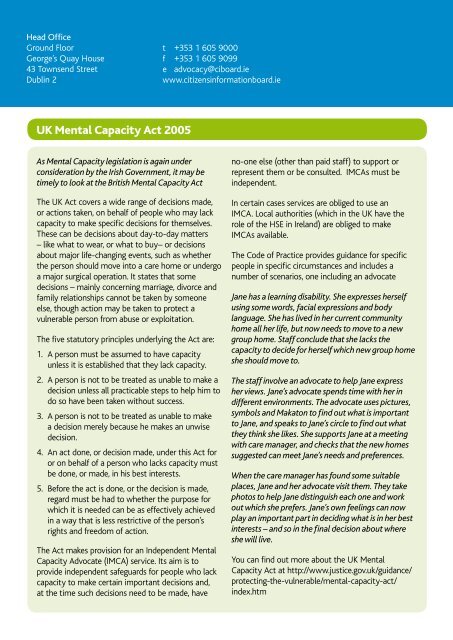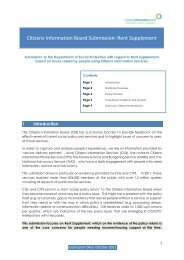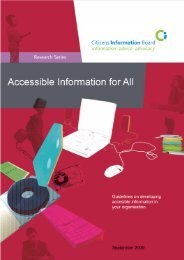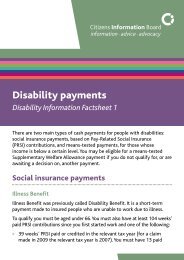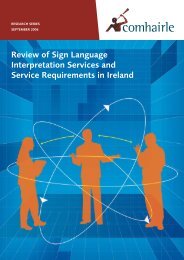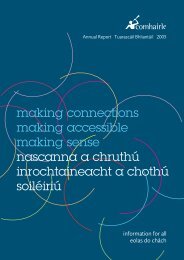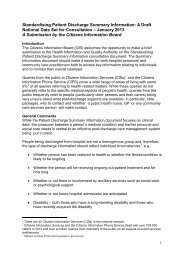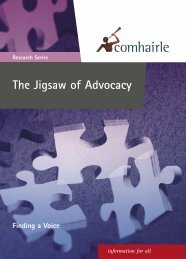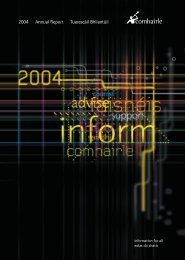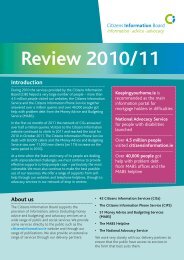Speaking up for Advocacy - Issue 15 October 2011 (pdf) - Citizens ...
Speaking up for Advocacy - Issue 15 October 2011 (pdf) - Citizens ...
Speaking up for Advocacy - Issue 15 October 2011 (pdf) - Citizens ...
You also want an ePaper? Increase the reach of your titles
YUMPU automatically turns print PDFs into web optimized ePapers that Google loves.
Head Office<br />
Ground Floor<br />
George’s Quay House<br />
43 Townsend Street<br />
Dublin 2<br />
t +353 1 605 9000<br />
f +353 1 605 9099<br />
e advocacy@ciboard.ie<br />
www.citizensin<strong>for</strong>mationboard.ie<br />
UK Mental Capacity Act 2005<br />
As Mental Capacity legislation is again under<br />
consideration by the Irish Government, it may be<br />
timely to look at the British Mental Capacity Act<br />
The UK Act covers a wide range of decisions made,<br />
or actions taken, on behalf of people who may lack<br />
capacity to make specific decisions <strong>for</strong> themselves.<br />
These can be decisions about day-to-day matters<br />
– like what to wear, or what to buy– or decisions<br />
about major life-changing events, such as whether<br />
the person should move into a care home or undergo<br />
a major surgical operation. It states that some<br />
decisions – mainly concerning marriage, divorce and<br />
family relationships cannot be taken by someone<br />
else, though action may be taken to protect a<br />
vulnerable person from abuse or exploitation.<br />
The five statutory principles underlying the Act are:<br />
1. A person must be assumed to have capacity<br />
unless it is established that they lack capacity.<br />
2. A person is not to be treated as unable to make a<br />
decision unless all practicable steps to help him to<br />
do so have been taken without success.<br />
3. A person is not to be treated as unable to make<br />
a decision merely because he makes an unwise<br />
decision.<br />
4. An act done, or decision made, under this Act <strong>for</strong><br />
or on behalf of a person who lacks capacity must<br />
be done, or made, in his best interests.<br />
5. Be<strong>for</strong>e the act is done, or the decision is made,<br />
regard must be had to whether the purpose <strong>for</strong><br />
which it is needed can be as effectively achieved<br />
in a way that is less restrictive of the person’s<br />
rights and freedom of action.<br />
The Act makes provision <strong>for</strong> an Independent Mental<br />
Capacity Advocate (IMCA) service. Its aim is to<br />
provide independent safeguards <strong>for</strong> people who lack<br />
capacity to make certain important decisions and,<br />
at the time such decisions need to be made, have<br />
no-one else (other than paid staff) to s<strong>up</strong>port or<br />
represent them or be consulted. IMCAs must be<br />
independent.<br />
In certain cases services are obliged to use an<br />
IMCA. Local authorities (which in the UK have the<br />
role of the HSE in Ireland) are obliged to make<br />
IMCAs available.<br />
The Code of Practice provides guidance <strong>for</strong> specific<br />
people in specific circumstances and includes a<br />
number of scenarios, one including an advocate<br />
Jane has a learning disability. She expresses herself<br />
using some words, facial expressions and body<br />
language. She has lived in her current community<br />
home all her life, but now needs to move to a new<br />
gro<strong>up</strong> home. Staff conclude that she lacks the<br />
capacity to decide <strong>for</strong> herself which new gro<strong>up</strong> home<br />
she should move to.<br />
The staff involve an advocate to help Jane express<br />
her views. Jane’s advocate spends time with her in<br />
different environments. The advocate uses pictures,<br />
symbols and Makaton to find out what is important<br />
to Jane, and speaks to Jane’s circle to find out what<br />
they think she likes. She s<strong>up</strong>ports Jane at a meeting<br />
with care manager, and checks that the new homes<br />
suggested can meet Jane’s needs and preferences.<br />
When the care manager has found some suitable<br />
places, Jane and her advocate visit them. They take<br />
photos to help Jane distinguish each one and work<br />
out which she prefers. Jane’s own feelings can now<br />
play an important part in deciding what is in her best<br />
interests – and so in the final decision about where<br />
she will live.<br />
You can find out more about the UK Mental<br />
Capacity Act at http://www.justice.gov.uk/guidance/<br />
protecting-the-vulnerable/mental-capacity-act/<br />
index.htm


